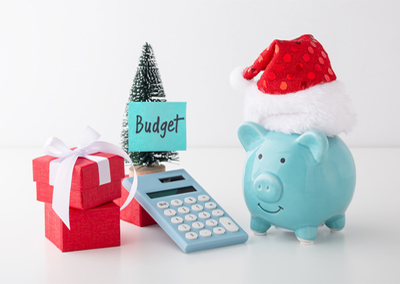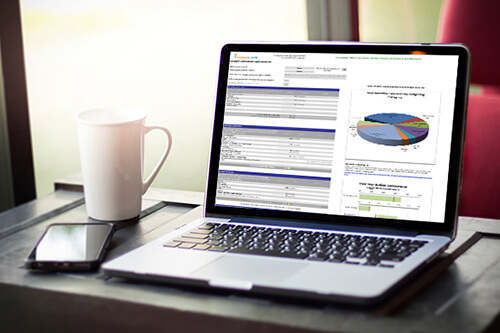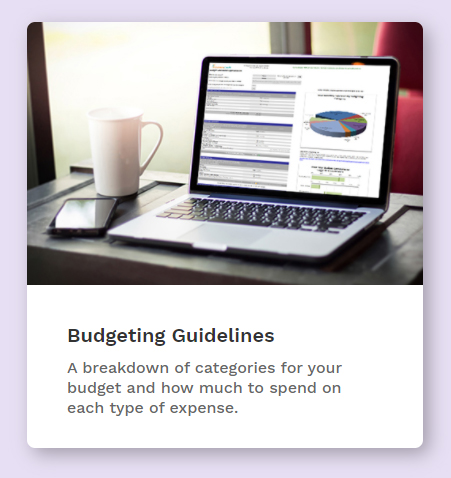How to Get Through Holiday Spending When You’re Tackling Debt Repayment
By Julie Jaggernath
The holiday season brings with it shopping lists, holiday spending, more elaborate meals, and other costly means of merrymaking For Canadians already struggling with credit card debt and debt repayment, it’s an especially tricky time of year to keep finances in check. Recent survey data from Equifax Canada found that six-in-ten consumers (60 percent) planned to spend less on gifts this holiday season due to the financial pressures of inflation. Another 41 percent said they will limit their holiday spending because they are already carrying too much debt, up from 36 percent last year.
Plans to cut back on holiday spending also vary across the age groups. Almost one-in-four (23 percent) of younger adults ( aged 18-34), said they are more likely to increase their spending this year. Meanwhile, just four percent of those aged 55 and over expected their holiday spending to increase. While trying to lower costs this time of year can be challenging, it’s a good way to avoid the dreaded New Year’s debt hangover.
So how do you navigate an expensive month with Christmas gifts to put under the tree, family dinners to plan and host, and all the other odds and ends that come with the holiday season? Whether you’ve got one week, one month, or one year to plan, here’s a step-by-step guide to getting through the holiday season while staying on course with your debt repayment.
Don’t Abandon Your Debt Repayment Plan

As difficult as it is to manage costs in our challenging economy, do your best not to skip making a payment to your credit cards, debt consolidation plan, or any other debt repayment plan you’ve committed to. The key to financial success and debt repayment is creating an achievable budget — one you can stick to and follow through on. While it can be tempting to take a break from your financial obligations during such an expensive month, it’s crucial to try to stay on budget, even during the holidays. If you do skip payments, you’ll have the extra stress of trying to catch up in the new year.
Instead, consider how much income you have for the month, and account for all of your regular expenses, including your rent, bills, and groceries. Remember to include your debt repayment plan, whether it’s a debt consolidation loan you’re making monthly payments on or payments to credit card companies for balances you’re chipping away at – they all need to be addressed in your budget.
While December is an expensive month, you need to make sure you don’t give up on your repayment goals, especially if you want to stay on track for success in the new year.
Once the essentials are taken care of, the money that you have left over can be used for your Christmas spending. Keep in mind while you’re budgeting, some categories, such as prepping lunch for the work and/or school week, won’t need as much money during this time, so you can also allocate the surplus to your Christmas spending budget.
10 Tips for Paying Off Credit Card Debt
Plan Your Christmas Shopping List
This month take a cue from Santa; be sure to shop with a list and check it twice. Think of everyone in your family you still need to shop for, the groceries you may need to buy for those special Christmas meals, and then look at how much you can afford to spend on each category. Try to be as detailed as you can with your holiday shopping plan. For example, you may need to buy six presents, but don’t just assign an amount like $20 on each person – you’re likely to spend more on your partner or significant other than on your siblings or a family friend. Allocate a specific amount of money for each gift.
Building this plan is the easier part – it’s sticking to the guidelines that you’ve set that can be tough, especially if you’re shopping at the last minute. This is why creating a blueprint for your shopping is so helpful. If you know you’re only allowed to spend $20 on your siblings and $50 on your spouse, you won’t blow your budget when you’re doing your Christmas shopping at the mall or online.
The same goes for your family dinners and hosting events – with a set budget to spend at each store, and with a precise grocery list of what you need to buy, you’ll make your trips more time- and cost-efficient.
13 Surprising Ways to Save at the Grocery Store
Use Your Gift Cards and Rewards Points Strategically
After doing some number crunching with the December budget, and seeing what’s left for holiday spending, it may seem like you’ll need a Christmas miracle to manage without overspending. Stretch your budget further by getting creative and strategic with the resources you have – specifically gift cards and credit card reward points.
Have a search through your home, if you’re like many of us, you’ll have some unused gift cards hiding out in drawers, dressers, coat pockets, or random envelopes. sear. Combing through your inbox on the other hand, could also unearth some Amazon vouchers and perhaps some useful coupons or discount codes. These unexpected extras are a tremendous help to your budget, offsetting your expenses and freeing up more of your Christmas cash. If you have a $50 gift card, that could easily buy a few gifts for your family or friends.
Most of us also stockpile credit card points and store loyalty points throughout the year, waiting for the right time to redeem them. Credit card points can often be converted into discounts on airfare, gas, or groceries, and even traded in for electronics, jewellery, or gift cards – all of which could make great gifts for your loved ones at Christmas time. Your store loyalty points can be traded in for steep discounts or into monetary value at the cash register, too. Some types of points can even be gifted to others, essentially giving them funds towards airfare or merchandise they’ve got their eyes on.
Using these points for holiday shopping is a great way to keep your spending within your budget.
How Do I Know If a DIY Debt Repayment Program Will Work?
Go On a Cash-Only Diet
The most practical way to keep your debt from growing during the holiday season is to keep your credit cards tucked away so you aren’t even able to swipe or tap with money you don’t have. Cash-only diets are a great strategy to ensure you stick within the confines of your budget for each financial category.
If you’re only allowed to spend $300 on Christmas gifts, put that amount in an envelope, indicate how much is allocated for each gift, and accept that once the money runs out for each person you’re shopping for, there’s no turning back.
While shopping with a credit card allows you to collect points, cashback, or other rewards, a cash-only approach is an especially important step if you’re unable to shop with plastic and pay off the balance in full afterwards.
How to Save Time and Money on Christmas Gifts
Get Your Family Involved
According to the Equifax poll, 57 percent of consumers plan to prepare a budget for their holiday shopping. With everyone’s purse strings tightening, have an honest conversation with your loved ones and your family to set limits on spending. Through discussions, your family may choose to have a potluck dinner or share the expenses for a holiday feast so that one family member isn’t solely responsible for the bill for the whole occasion. Beyond reigning in the excess that can come with gift-giving, having an open conversation about everyone’s budgets and expectations is a great way to ensure you aren’t spending beyond your means.
Avoid Signing Up to More Debt
With the Christmas season comes an onslaught of “buy now, pay later” promotions, pay in installment plans, store credit cards with initial signup bonuses, and other gimmicks that promise you a deal to lure you in and spend more.
If you’re already grappling with debt, your best bet is to steer clear of these offers, as enticing as they seem. If you’re considering a “buy now, pay later” deal, think about whether you’ll have the money later or if you’ll only further exacerbate your situation. Store cards come with steep interest rates and you’ll want to avoid the extra credit at your fingertips too.
Save Year-Round
Ideally, at the start of the year, you’ll create an annual budget carving out savings for a handful of categories: travel, new clothes, or upcoming weddings and birthdays. Christmas gifts and holiday spending deserve a slot on your annual budget, too.
Saving for events like Christmas for the year ahead is often overlooked and this is why consumers end up in hot water after their December splurging.
With your newfound foresight, in 2020, work a small sum into your monthly budget to save towards Christmas. Putting away $20 to $50 a month could leave you with $240 to $600 by the end of the year to pay for holiday expenses.
Christmas and Holiday Round-Up: Save, Plan Ahead, and Keep Your Resolutions
The Best Debt Repayment Motivation is Remembering How You Felt Last January
Before pulling out your credit card to escape the confines of your budget, think back to how long it took to repay your debt after Christmas last year, or how much further it set you back. The third Monday in January is known as “Blue Monday” – it’s when the excitement of the holidays wears off, the bills pour in, and you’re faced with the financial fall out of the previous month. This new year, you can avoid Blue Monday by making financial choices that will benefit you all year long. Planning a wonderful holiday season with family and friends – without breaking your budget, is a great place to start.
Last Updated on June 6, 2024






0 Comments